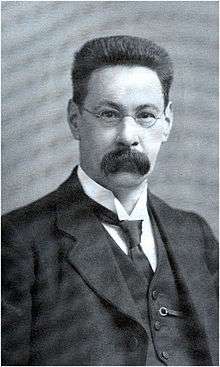Thomas Walker Arnold
Sir Thomas Walker Arnold CIE (19 April 1864–9 June 1930) was a British orientalist and historian of Islamic art. He taught at Muhammadan Anglo-Oriental College,[1] later Aligarh Muslim University, and Government College University, Lahore.[2]
Thomas Walker Arnold | |
|---|---|
 Sir Thomas Arnold | |
| Born | 19 April 1864 Devonport, Devon, England |
| Died | 9 June 1930 (aged 66) |
| Scientific career | |
| Influenced | Muhammad Iqbal |
Arnold was a friend of Sir Syed Ahmed Khan, who influenced him to write the famous book The Preaching of Islam,[2] and of Shibli Nomani, with whom he taught at Aligarh. He taught Syed Sulaiman Nadvi and the poet-philosopher Muhammad Iqbal.[3] He was the first English editor for the first edition of The Encyclopaedia of Islam.[2]
Life
Thomas Walker Arnold was born in Devonport, Plymouth on 19 April 1864,[4] and educated at the City of London School. From 1888 he worked as a teacher at the Muhammadan Anglo-Oriental College, Aligarh. In 1892 he married Celia Mary Hickson,[2] a niece of Theodore Beck.[4] In 1898, he accepted a post as Professor of Philosophy at the Government College, Lahore and later became Dean of the Oriental Faculty at Punjab University.[2] From 1904 to 1909 he was on the staff of the India Office as Assistant Librarian. In 1909 he was appointed Educational Adviser to Indian students in Britain.[4] From 1917 to 1920 he acted as Adviser to the Secretary of State for India.[5] He was Professor of Arabic and Islamic Studies at the School of Oriental Studies, University of London, from 1921 to 1930.[2]
Arnold was invested as a Companion of the Order of the Indian Empire in 1912, and in 1921 was invested as a knight. He died on 9 June 1930.[6]
Works
- The preaching of Islam: a history of the propagation of the Muslim faith. Westminster: A. Constable and co. 1896. Retrieved 29 May 2011.
- (trans. and ed.) The little flowers of Saint Francis by Francis of Assisi. London: J.M. Dent, 1898.
- The Court Painters of the Grand Moghuls. Oxford: Oxford University Press, 1921.
- The Caliphate. Oxford: Clarendon Press, 1924. Reissued with an additional chapter by Sylvia G. Haim: Routledge and Kegan Paul, London 1965.
- Painting in Islam, A Study of the Place of Pictorial Art in Muslim Culture. Oxford: Clarendon Press, 1928. Reprint ed. 1965.
- Bihzad and his Paintings in the Zafar-namah ms. London: B. Quaritch, 1930.
- (with Alfred Guillaume) The Legacy of Islam. Oxford: Oxford University Press, 1931.
- The Old and New Testaments in Muslim Religious Art. London: Pub. for the British Academy by H. Milford, Oxford University Press. Schweich Lectures for 1928.
References
- "Empire in Your Backyard: Imperial Plymouth". www.britishempire.co.uk. Retrieved 5 May 2016.
- electricpulp.com. "ARNOLD, THOMAS WALKER – Encyclopaedia Iranica". www.iranicaonline.org. Retrieved 8 August 2016.
- "Sir Thomas Walker Arnold | Aligarh Movement". aligarhmovement.com. Retrieved 8 August 2016.
- "Thomas W. Arnold | Making Britain". www.open.ac.uk. Retrieved 8 August 2016.
- "Thomas Walker Arnold". Goodreads. Retrieved 8 August 2016.
- Arnold, Thomas Walker (1 January 1913). The preaching of Islam : a history of the propagation of the Muslim faith. London : Constable.
External links
- Arnold, Sir Thomas Walker, School of Oriental and African Studies: home page
- Sir Thomas Walker entry in Encyclopaedia Iranica
- The Archive of the Council for World Mission is held at the School of Oriental and African Studies, London.